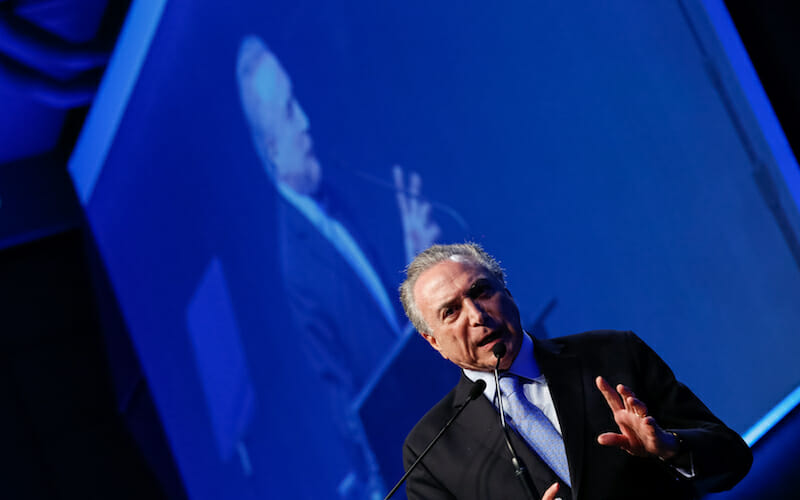
Brazilian Elections Hold Little Promise of Change
The news that the Brazilian Worker’s Party (PT) has named the imprisoned former President Luiz Inácio Lula da Silva as its presidential candidate only serves to underline the quagmire that Brazilian politics have become. Indeed, less than two months ahead of election day, the country faces an underwhelming lineup of candidates and a corruption scandal that shows no sign of ending – even after having entangled three successive presidents.
What’s worse, the anti-corruption movement in Brazil has shown itself to be deeply flawed, willing to cut corners and to find entities guilty of wrongdoing with dubious evidence when it is politically expedient. What does this mean for the country’s prospects for much-needed change?
Tattered public trust
Lula served as Brazil’s president from 2003 to 2011, when he oversaw an anomalous period of economic growth, introducing numerous reforms to help the country’s poor and leaving office with an approval rating of 84%. However, the intervening years have seen a fiscal backslide, growing civil unrest, and escalating street violence. Over 60,000 Brazilians were murdered in 2017 alone, more than 60 political activists have died this year, and according to one set of estimates, a police officer is killed every 54 hours in Rio state.
In parallel with this growing turbulence has come a surge in public disillusionment with the political establishment. The same far-reaching corruption investigation that implicated Lula – Operacao Lava Jato or Operation Car Wash – also served to unseat his successor, Dilma Rousseff. Meanwhile, the record of her replacement, Michel Temer, has been hardly better. In a failed effort to stoke the economy, he has implemented a policy of such severe austerity that his approval ratings are hovering around 3%. Adding insult to injury, he too has since been accused of wrongdoing, with ongoing investigations into corruption linked with the meatpacking company JBS. So far, only his stranglehold on the senate has stopped him from being prosecuted as well.
All of this has worked to create a deep mistrust of the political system from the populace; at present, a mere 13% of Brazilians say they are happy with democracy in the country and a staggering 55% say they are open to non-democratic alternatives.
Integrity of Car Wash in question
Given this, some would argue that a thorough purge is exactly what the country needs to shore up stability and public trust in institutions. Unfortunately, however, the very body that was set up to weed out the guilty parties has itself been accused of bias. For instance, though the evidence against Lula is incontrovertible, the manner in which his case was handled left much to be desired. An expedited conviction and allegations of dubious impartiality in the presiding judge meant that Lula’s supporters feel he was never granted a fair trial.

The same suggestions of political partisanship abound in many other of Operation Car Wash’s dealings. For one thing, while investigators have brought charges against over 150 figures to date, the majority of these have been associated with PT or other left-leaning parties. Meanwhile, right and center-right individuals, including the incumbent president, have largely escaped prosecution.
In a country where corruption runs so rampant, concerns about the potential bias of Lava Jato has major implications for other ongoing graft investigations in the country.
After all, two of Car Wash’s biggest targets – the conglomerate Odebrecht and state-owned gas company Petrobras – are far from the only firms that have been accused of corruption in the country. A number of other corruption investigations that have overlapped with Lava Jato include Operacao Panatenaico, which involved alleged bribes paid by construction firms in exchange for contracts to build World Cup stadiums, and Operacao Zelotes, which investigated bribes supposedly paid by Ford’s Brazilian subsidiary and other firms to tax officials. More recently, Brazilian authorities have also launched a number of separate probes into foreign firms, including multinational conglomerate GE; British engineering firm Rolls Royce, the Swiss authentication company SICPA; and US oil services company Vantage Drilling, among others.
At a time when such doubt has been cast on Lava Jato, however, it is impossible to know at this stage the extent to which these investigations are legitimate, or mere attempts at political point scoring. As a result, the probes run the risk of keeping the country mired in the past at a time when it should be trying to move forward.
In any event, Temer has indicated that he wants to wind down Lava Jato’s activities. The taskforce was disbanded in July, and while the president has insisted it will continue its work in a different guise, critics speculate that he is laying the groundwork for closing it down altogether. One of his closest allies, Romero Juca, was recorded plotting to obstruct Car Wash’s work on tape – forcing him to resign from his seat, though he now leads Temer’s coalition in the senate.
A country in dire need of reform
At a time like this, an election may seem to be just the opportunity for change the country needs. Unfortunately, however, Brazil’s most tainted parties look likely to survive the poll. After all, it speaks volumes that even from behind bars, Lula remains the country’s most popular politician. With his candidacy likely to be rejected by the authorities later this month, it remains to be seen whether PT can successfully shift public support for him to his running mate Fernando Haddad. If not, the vacuum created could be filled by Jair Bolsonaro, a far-right supporter of military rule whose running mate has repeatedly spurned women, indigenous people, and blacks. Meanwhile, other, more centrist candidates – such as Geraldo Alckmin, the former governor of São Paulo – face an uphill battle among an electorate eager to upset the establishment.
Of course, the return of the beleaguered PT or the victory of an extremist like Bolsonaro would not only mean bad news for Brazilian democracy, but also for efforts to inject new life into the anti-corruption movement. With such an underwhelming array of candidates to choose from, however, the country may well be facing a bleak outcome in October.

